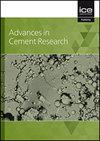掺入华盛顿罗布斯塔纤维的混凝土化学和热力学性能实验研究
IF 1.3
4区 工程技术
Q3 CONSTRUCTION & BUILDING TECHNOLOGY
引用次数: 0
摘要
这项工作旨在为隔热建筑应用提供新型复合材料。这种复合材料是用从 WR 棕榈树叶柄中提取的天然纤维增强砂浆制成的。首先通过 EDS、SEM、X 射线和红外衍射光谱以及拉伸试验对所用纤维进行化学表征,以了解其形态结构。然后,将纤维以 0% 至 4% 的不同质量百分比加入砂浆中,通过实验确定所制造样品的热机械性能。化学研究结果表明,WR 纤维含有丰富的纤维素、半纤维素和木质素,并具有较高的结晶度指数,这增强了复合材料的机械性能和耐久性。此外,W2RC4% 复合材料的密度为 1305 kg/m3,小于 2000 kg/m³;根据 NF EN 206+A2/CN 标准(2022 年),该复合材料可归类为轻质混凝土。导热系数和热效率分别降低了约 60% 和 42%。此外,WR 还降低了抗压强度(76%)和抗弯强度(36%),最低值分别为 5.9 兆帕和 3.8 兆帕。这些值符合轻质混凝土的机械要求(3.5 兆帕)。本文章由计算机程序翻译,如有差异,请以英文原文为准。
Experimental investigation on chemical and thermomechanical properties of concrete incorporating Washingtonia Robusta fibers
This work aims to provide new composite material for thermal insulating building applications. The composite was made with mortar reinforced with natural fibers that were extracted from petiole of WR palm tree. The used fibers were first chemically characterized by EDS, SEM, X-ray and infrared diffractometry spectroscopies as well as tensile test to know their morphological structure. Afterward, the fibers were incorporated into mortar with different mass percentages varying from 0 to 4% to experimentally determine the thermomechanical properties of the manufactured samples. The chemical findings indicated that the WR fibers are rich in cellulose, hemicellulose, and lignin, and possess high crystallinity index; which enhance the mechanical properties and durability of the composite. Furthermore, the obtained density of the composite W2RC4% is of 1305 kg/m3 and less than 2000 kg/m³; this composite can be then classified as lightweight concretes according to the standard NF EN 206+A2/CN (2022). The thermal conductivity and thermal effusivity dropped by about 60% and 42% respectively. Moreover, the WR reduces the compressive strength (76%) and the flexural strength (36%) to minimum values respectively of 5.9 MPa and 3.8 MPa. These values meet the mechanical requirements of lightweight concretes (>3.5 MPa).
求助全文
通过发布文献求助,成功后即可免费获取论文全文。
去求助
来源期刊

Advances in Cement Research
工程技术-材料科学:综合
CiteScore
3.70
自引率
5.00%
发文量
56
审稿时长
3.2 months
期刊介绍:
Advances in Cement Research highlights the scientific ideas and innovations within the cutting-edge cement manufacture industry. It is a global journal with a scope encompassing cement manufacture and materials, properties and durability of cementitious materials and systems, hydration, interaction of cement with other materials, analysis and testing, special cements and applications.
 求助内容:
求助内容: 应助结果提醒方式:
应助结果提醒方式:


